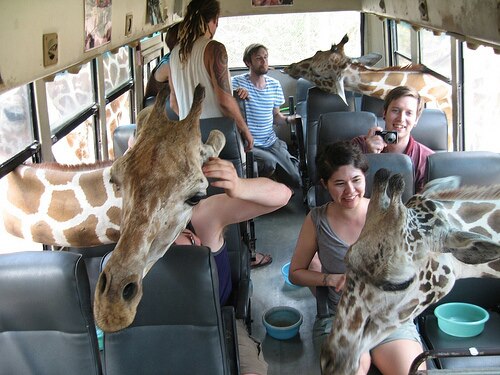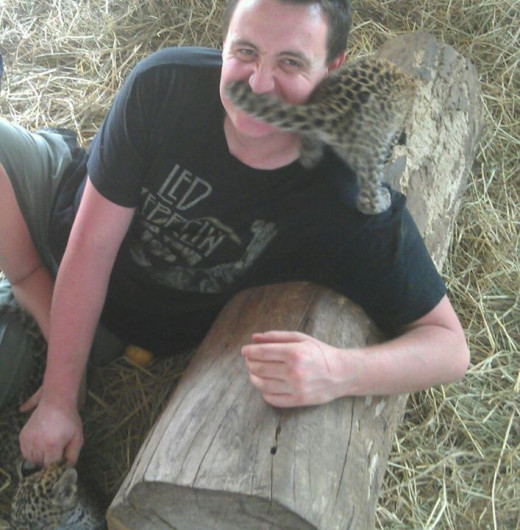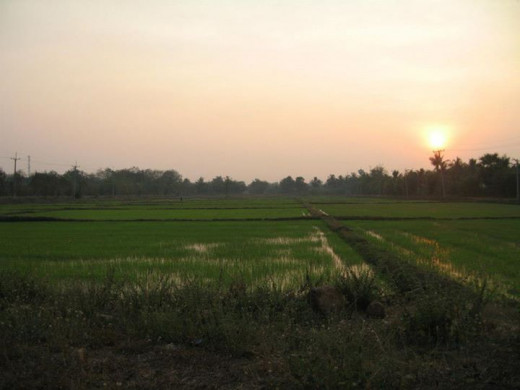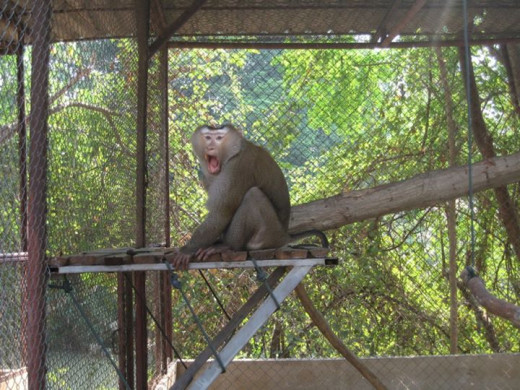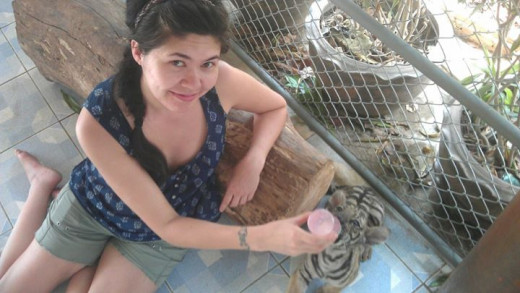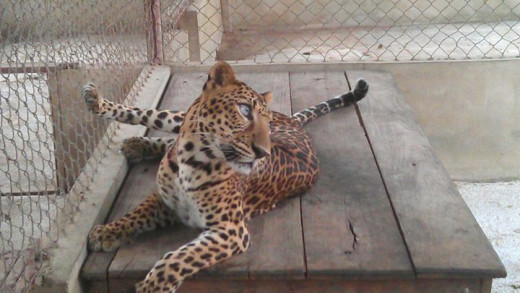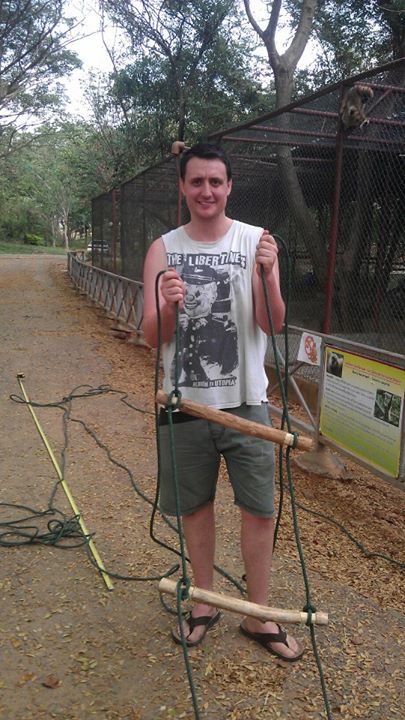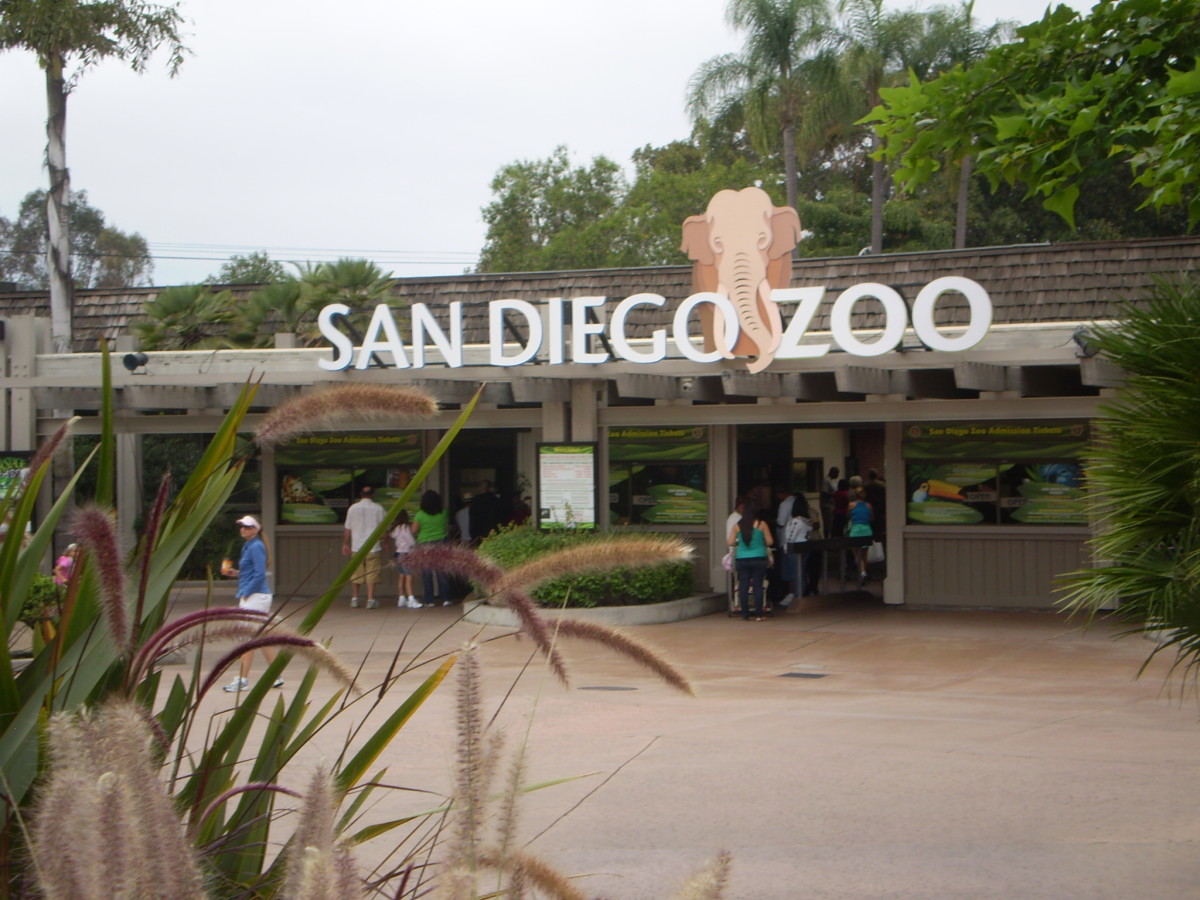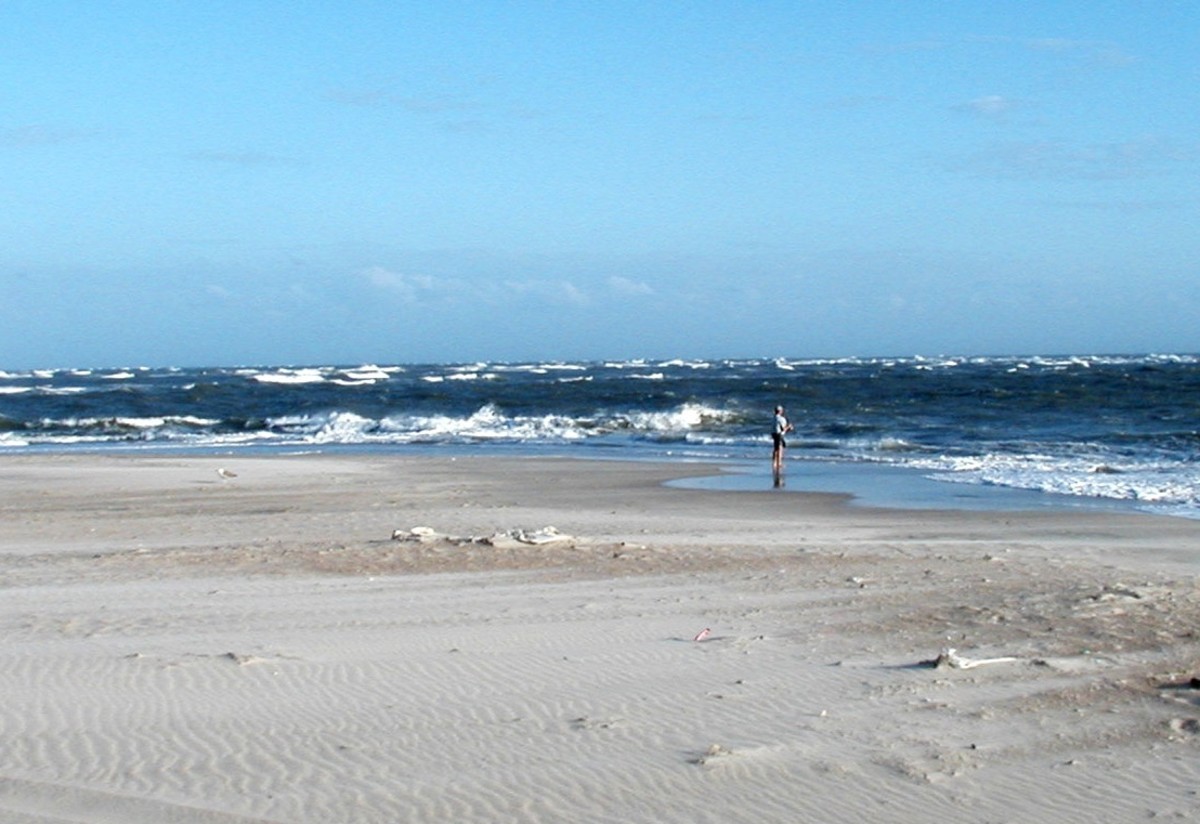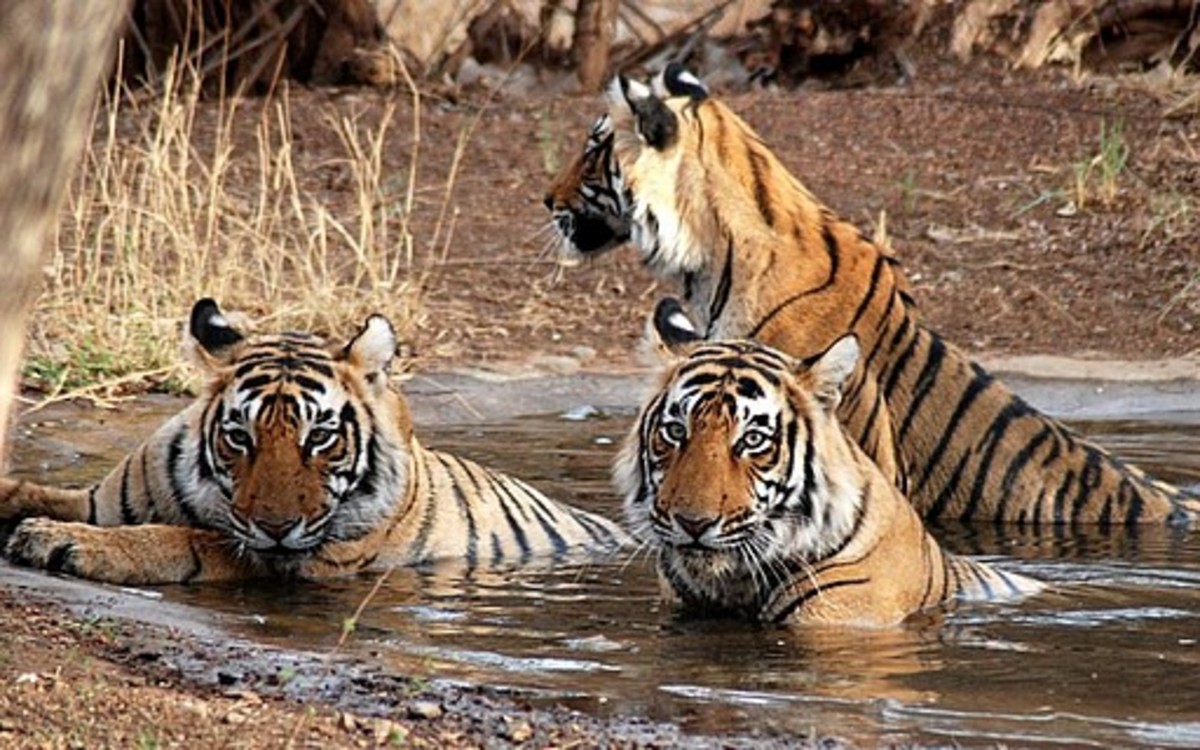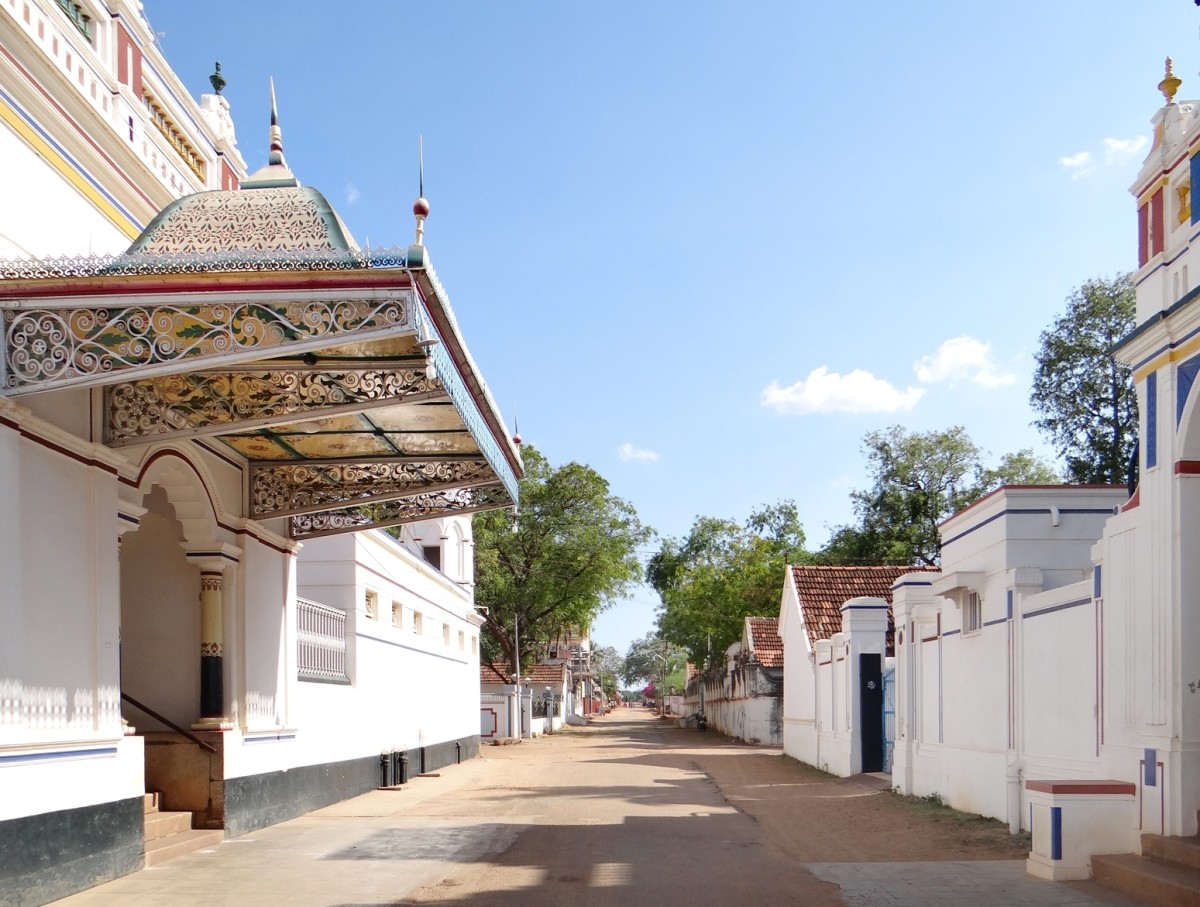My Wildlife Volunteering Experience in Thailand
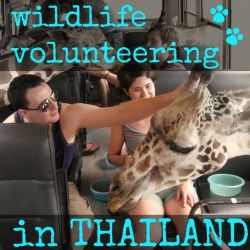
Wildlife Volunteering at the Safari Park Open Zoo in Kanchanaburi, Thailand
In 2013 I volunteered at the Safari Park Open Zoo in Kanchanaburi, Thailand, working with other wildlife volunteers from around the world to improve the lives of animals living in the park.
The program was started by Tat Jones, who first visited the Safari Park Open Zoo as a tourist. Tat was appalled by the poor conditions at the park. Many of the animals lived in small, dirty cages, suffered from unhealthy diets, and received little to no enrichment activities. Unfortunately, this is an all too common problem in Thailand's many animal parks.
Tat was so shocked by what she saw that she approached the owners and gained permission to start the Safari Park Open Zoo Volunteer Initiative. I had the privilege of visiting Kanchanaburi and volunteering at the Safari Park Open Zoo for two weeks in January 2013, shortly after the launch of the volunteer program.
It is hard to believe I was only at the Safari Park Open Zoo for two weeks. I had so many incredible, once in a lifetime experiences with the animals and the local Thais whose lives revolve around the park. Every day was hard yet satisfying work improving the lives of animals. Daily activities ranged from cleaning and improving animal cages to creating strategies for educating the local tourism industry about responsible tourism.
I highly encourage anyone travelling to Thailand to go to Kanchanaburi and volunteer at the Safari Park Open Zoo, or simply visit and show your support if you are short on time.
All images by the Author
Safari Park Photo Gallery
Click thumbnail to view full-size






The Volunteering Experience
What is life like at the Safari Park Volunteer program?
Mornings at the Safari Park start early. Hungry animals don’t allow for a sleep in! We met at 7am sharp every morning. An early start made a bit easier by the serene morning views over the rice paddies and hot coffee, Thai style with sticky sweet condensed milk.
After a brief meeting we would all hop on our motorbikes and head off to the eagerly awaiting monkey and leopards. Splitting into teams, we would do a thorough cleaning of each cage.
Sadly, prior to the arrival of Tat and the volunteers, the cages had gone un-cleaned for over a decade! When we arrived there were still a few cages yet to be deep cleaned and we were fortunate to be able to help out with two. A deep clean was hard work and involved scrubbing (literally on our hands and knees) years of filth from the cages. After cleaning, the cages were fit out with enrichment materials, such as leaves for foraging, trees for climbing and toys for playing. Although these deep cleans were some of the hardest work, they were also the most rewarding. Watching the monkeys’ reactions to their new environments was amazing; a reminder that we are not that far removed from our monkey cousins!
Such deep cleaning wasn't required on a daily basis. Most mornings we did a quick tidy and then began one of my favourite parts of the day - monkey feeding! We were taught how to safely feed the monkeys and then each day were assigned a monkey to feed. This was a great opportunity to bond with the monkeys. Each certainly has their own personality, from sweet (Ol' Gramps) to incredibly cheeky (Jam!)
After our morning chores we would meet for team breakfast and plan the rest of our day. Generally, after lunch we did individual projects, like working on the website, designing new enclosures, building enrichments for the animals or brainstorming fundraising ideas. For example, recent volunteers have come up with the idea to sell tiger cub paw prints to raise money for a new enclosure! Tat and the team were incredibly supportive of new ideas and volunteers were given space to be creative.
In addition to these projects, volunteers were also needed to take care of the baby leopards and tigers. Most of the big cats at the park live in large, open enclosures on safari. However, the babies are too little and were kept in small cages throughout the day. At least, they did before the volunteers arrived. The volunteers rescue the cubs during the day to a large pen near the front of the park and cubsit. With a volunteer on duty to look after the cubs, they could roam free in the pen and were also taken on walks. Looking after the baby tigers and leopards was a highlight of the experience - words can't describe the feeling of having a tiny leopard sleeping on your lap or bottle feeding a tiger.
We would return to feed the monkeys in the late afternoon. This was one of my favourite parts of the day. Most tourists were gone by then and it was a beautiful, peaceful time to be one and one with a monkey.
Although most days followed a routine, no two days at the park are ever the same. In addition to supporting the animals, volunteers also worked to improve the lives of the Thais working at the Safari Park. I helped teach English to very enthusiastic students in the evenings, my partner played football with kids from the local village. These interactions were just as important and memorable as the animal experiences.
Life at the Safari Park was not all work, no play. Tat and Ned, the program coordinators, work hard to make sure that all volunteers get special treats, like bareback elephant rides and feeding the giraffes on safari. In addition, there were team activities like a bonfire dinner and nights out in Kanchanaburi.
Volunteering at the Safari Park was an incredible, life changing experience. My only regret was we didn't stay longer. If you are interested in volunteering, or even just visiting the park and doing one of their incredible experiences, visit their website www.safarivolunteer.com
Travel Light
You won't need much for your stay at the safari park. Here are a few items I recommend.

What to read more about Voluntourism?
Make a positive contribution and travel around the world!
What You Need to Know About Volunteering
Kanchanaburi is located about 2 hours from Bangkok, easily accessible by bus or train. You will need to make your own way to Kanchanaburi, but Tat will give you all the details about timetables, price etc.
You will need to hire a motorbike. The Safari Park Volunteer program has negotiated special rates with a reliable hire company, so you know you won't get ripped off.
The Safari Park is located about 45 minutes from Kanchanaburi by motorbike.
While at the Safari Park, you will be provided with a private room and bathroom. The rooms are clean and comfortable, but they are basic, so if you need air conditioning or other luxuries this isn't the place for you. All meals are provided as well so this is a great way to keep your costs down and travel for longer! But don't come if you're not prepared to work hard.
Volunteers are asked to pay a small daily fee, to cover the cost of their accommodation and food - anything left over supports the animal projects. The fee is very low and reasonable - much less than you would be spending if you were travelling and not staying at the park. Please do not debate this fee. There is a lot of discussion about not paying for volunteering. There is a difference between paying $3,000 to a tourism company for a "Volunteer Holiday" and paying a small fee to a grassroots charity to help cover their costs.
Volunteers with all types of skills are needed. However, you will be most valuable the longer you stay. Please see their website for more details. www.safarivolunteer.com
Travelling in Southeast Asia
Here are other helpful articles I've written about my travels in Southeast Asia, as well as some other opportunities to get close to animals.
- A Packing List for Backpacking in Southeast Asia
Backpacking in Southeast Asia is an amazing experience, but knowing what to bring and deciding on a packing list can be overwhelming. - How to Travel the Bolaven Loop by Motorbike
Looking for adventure? The Bolaven Loop is an off the beaten track, self guided motorbike trip through the Bolaven Plateau in southern Laos. - Elephant Stay
I did a 2night/3day package here in 2008 and I was able to spend so much time with the elephants. One of the best experiences of my life (review to come!) - Lanta Animal Welfare
Lanta Animal Welfare's focus is caring for the stray dogs and cats on Koh Lanta (as well as neutering and adoption programs.) There are opportunities for long term volunteers or you can stop by and take some of the dogs for a walk (we did!)
Don't be Unprepared, Get a Guidebook
I've travelled with and without a guidebook. It is soooo much easier to travel with one. Don't be a slave to your guidebook, get off the beaten track too, but having one will save you a lot of time and confusion. I have always used Lonely Planet Guidebooks and I happily recommend them.
The Ethics of Voluntourism with Animals in Thailand
There are varying opinions about the ethics of voluntourism with animals in Thailand. The Safari Park Open Zoo in Kanchanaburi still has many poor practices, such as Blue, an adult tiger that is kept chained to a table for tourists to have their photos taken. Most animal parks across Thailand and Southeast Asia have similar poor practices. There are many that would argue that supporting these parks in anyway in unethical and wrong. However, I disagree and believe this view is unrealistic and will do little to inspire real change in Thailand. A more realistic and practical approach requires providing incentives and education to the local tourism industry.
There are many that would suggest that responsible tourists should boycott all parks and institutions that have poor animal practices. I used to agree with this view. However, after researching, speaking to people involved in the industry, and volunteering in the park I now disagree for several reasons.
The number one reason is because it will not work. There are simply too many tourists that will continue to visit these parks because they want to get up close with tigers, elephants and other animals. Many of these visitors are local Thai tourists and they have not been educated about animal welfare. The parks will still continue to operate whether responsible tourists visit or not.
Another consideration are the animals and the many people whose lives revolve around the animal parks. Most of the animals at the park have been either born into captivity or have been in captivity for a very long time. These are not animals that can be released into the wild. In the case of elephants in Thailand, much of their habitat was destroyed through excessive logging and there is no longer the habitat to support them. These animals need humans to care for them in order to survive.
We also have to consider the staff at these parks. These parks support whole villages. Many of the villagers have worked at the parks their whole lives and have little education or skills, so it would be difficult for them to transition to other employment. These workers are paid very little and losing their jobs would create severe disruption to their lives.
Lastly, we must consider that these animals are currently living, day to day, in horrible conditions. Urgent action is required to improve their living conditions now. Any solution to the problem of their welfare must take this into consideration.
The Safari Park Open Zoo Volunteer Initiative provides a more realistic and practical solution to improving animal welfare in Thailand. This is done by improving the quality of life of the animals, educating the local tourism industry and provide incentives for change to generate from within.
As I described in my experiences at the park, volunteers do much to improve the day to day lives of animals. However, they also help create ethical tourism programs. One such example is the Big Cat Day Out. This amazing program allows you to get up close to the big cats and to learn responsible husbandry techniques. The proceeds of this program help improve the welfare of the cats, such as building a new enclosure for Blue and getting him off the chain.
Even better, if the volunteers can show the owners there is more money to be made in ethical programs, they will be able to inspire meaningful and sustainable change! The goal is to show the local owners that there is a financial incentive to change; that tourists are willing to pay to have ethical experiences with the animals.
Don't boycott the animal parks in Thailand altogether. Research for programs such as the Safari Park Open Zoo Volunteer Initiative and vote with your dollars. Support programs that are working to create change and provide education.
Do you believe voluntourism programs in Thailand, such as the Safari Park Volunteer Initiative, hurt or support efforts to improve animal welfare in Thailand?

